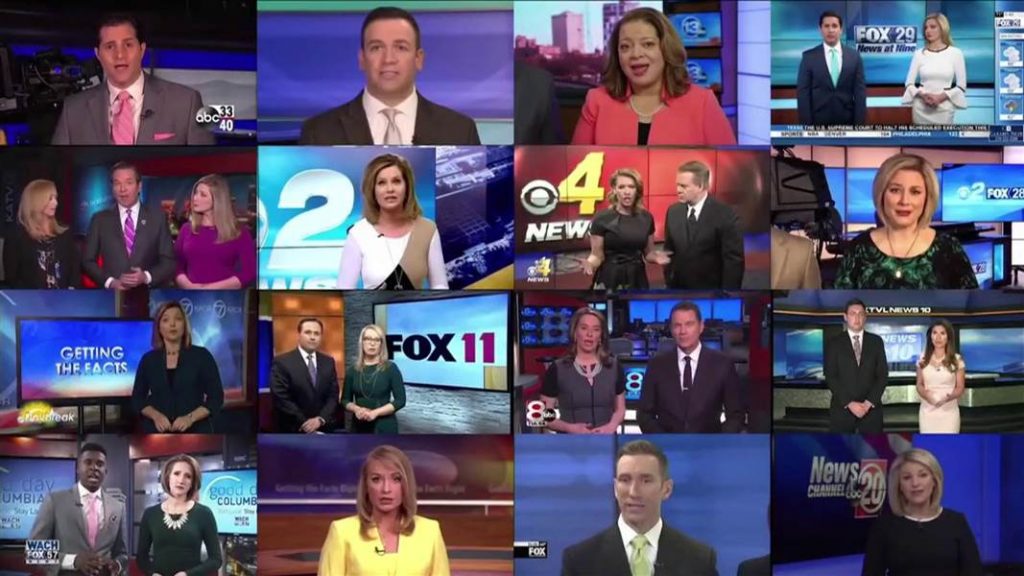President Trump, Sexual Assault, Police Brutality:
There's No Room For Your Opinion In TV News
Written by News Gal
🕒 March 04, 2018
Everyone has an opinion.
For instance, I think pink is the best color, competitive cheerleading is a sport, margaritas should be served with sugar rims, and dogs are better than cats. I have lots of other opinions, too, but I don’t share them.
As journalists we have to remain unbiased.
In the world of fake news and straight up hatred for reporters and photojournalists, it’s tough to defend ourselves and remain true to our jobs.
We have to cover tough topics like sexual assault, police brutality, and a very outspoken president. We all have opinions on these subjects, but we have to make sure we don’t let those opinions seep into our reporting.
So how do we do that?
First of all, if there is a story you’re assigned that you are too close to, and you know you cannot handle the coverage objectively, you need to speak up immediately. You have to tell your boss that you cannot report on the story.
You don’t want to put your company in danger of a lawsuit because you were not able to be fair and correct in your reporting.
Sexual harassment is a tough topic to cover.
I don’t think there is anyone who thinks sexual harassment and/or assault is OK. Of course you likely side with the victim, and feel terrible for them but you have to remember that if no one has been convicted you cannot convict anyone in your reporting.
If there is just a claim of sexual harassment or assault make sure you make it clear that no one has been charged.
Make sure you’re thinking of the victim, too.
Don’t sensationalize your story. Don’t let promotions turn your story into something more dramatic than it is. We’re talking about someones life.
Don’t cry when you’re doing your live shot. Yes, I’ve worked with a reporter who would cry with victims. I understand you’re human and you have feelings, but this is journalism, not a therapy session.
Everyone has an opinion about police brutality.
Some people think that if everyone followed the rules, police would not have to use force. Other people think police officers use force because they think they can get away with it.
Some people think police brutality is racially motivated.
I covered one of the most high-profile police brutality cases in the last five years. It was stressful. I watched the body camera video. I knew what I felt and thought about the situation, but I could not let that impact me.
I had to get reaction from all sides.
I interviewed Black Lives Matter activists, I interviewed the police chief, I interviewed citizens, retired police officers, and more.
I never agreed with anything any of them said.
I never disagreed with anything any of them said.
I had sound bites representing all sides of the issue in my reporting. I didn’t let the tone of my voice, the look on my face, or my body language show what I was thinking or feeling.
To this day I’ve never told anyone my opinion on the case, because I would never want someone to think it influenced my reporting.
President Trump and many of his supporters are not fans of ours.
To be fair, a lot of non-Trump supporters are not fans of ours either. I cannot tell you how many times someone has told me that I am “fake news” or that I must have a “liberal agenda” because I work for the media.
It’s frustrating to hear these things, but it’s part of our job these days.
Most of our Trump coverage comes from network. Be careful! We have found several network packages that are extremely slanted. You need to have both sides of each story.
If the President is blaming the Democrats for something, make sure you have a response from the Democrats. If the President is blaming Republicans for something, make sure you have a response from Republicans.
It is our job to hold our politicians and leaders accountable.
We must ask the tough questions, we must fact check, we must investigate claims, and we can’t just run with something because it’s our opinion.
We also cannot decide not to do a story or follow a lead because we disagree with the topic. Our job is to ask questions, get answers, and report what we find.
This is the important thing to remember: nobody cares about your opinion.
Your job is to present viewers with information to form their own opinions. Don’t use a delivery tone that lets people know what you think about a topic and don’t use words that clearly show favoritism or hatred.
When you’re assigned a tough topic, make sure a few people read over your script and web story. Sometimes you might slip your opinion into your work without even realizing it, and it will be a lot better if a manager catches that before it makes air, than if a viewer hears you say it.
Sometimes I don’t think it is fair that we can’t tell people what we really think.
You don’t even understand how many times I have had to catch myself before hitting ‘send’ on a Tweet or Facebook post.
If you’re working on a story and you feel like you might not be covering it fairly, because you either have a connection to the topic or a strong opinion about it, think back on other stories you have reported on.
Are you handling this one the same way? Are you covering all of your bases? Are you trying as hard to get answers?
If you didn’t answer yes to all of those, then you’re not leaving your opinion out of it.
If you’re unsure about if you’ve kept your opinion out of it, read your script for a co-worker or family member and ask if they can tell what your opinion is. If they know how you feel about the story after you read it to them, you might need to change a few things.
Every story has a who, what, when, where, and why. There is no opinion box.


